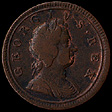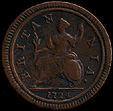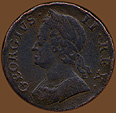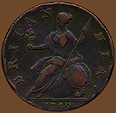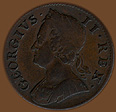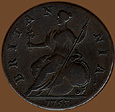Regal British Copper Halfpence
obverse |
|
reverse |
| |||
Halfpenny 1724 George I G1HD-125
Obverse: GEORGIVS . REX
Reverse: BRITAN NIA . 1724
Weight: 141.0 g (9.14 grams) Diameter: 27.8 mm
Comments: This example is from the final year of George I halfpence; it shows the third and final bust of the king to appear on the series. On the reverse threris a small die break above the second I in BRITANNIA. Also, in the date note the 1 and the 7 have a small 'foot' to the right. An example of a 1724 halfpenny was found in the Philadelphia Highway hoard.
Provenance: Donated to Notre Dame in 1887 as part of a 2,300 item coin collection (see: The Notre Dame Scholastic, vol. 21 (September 1887) 45.
obverse |
|
reverse |
| |||
Halfpenny 1749 George II G2HD-160
Obverse: GEORGIVS . II . REX .
Reverse: BRITAN NIA . 1749
Weight: 144.7 g (9.37 grams) Diameter: 28.2 mm
Comments: This shows the final of the three George II portraits and the second of two reverses used in this series. The example displayed here may have been part of the large group of some 800,000 halfpennies dated 1749 that were shipped to Massachusetts as partial payment to the colonists for their assistance in the Lewisburg expedition.
Provenance: Donated to Notre Dame in 1887 as part of a 2,300 item coin collection (see: The Notre Dame Scholastic, vol. 21 (September 1887) 45.
obverse |
|
reverse |
| |||
Halfpenny 1753 George II G2HD-180
Obverse: GEORGIVS . II . REX .
Reverse: BRITAN NIA . 1753
Weight: 133.0 g (8.61 grams) Diameter: 28.15 mm
Comments: Another example of the third obverse and second reverse design used by George II. The final George II halfpenny was issued in the following year. After 1754 no additional regal halfpence were minted until the George III issues of 1770-1775. This example appears to have been damaged by a planchet cutter on the reverse in an arc from the rim near the final I to the area past the stop down to the rim.
Provenance: From the Robert H. Gore, Jr. Numismatic Collection.
| British Coppers: p.1 | Section Contents | Well Worn Coppers |
|
For viewing tips and information on optimal computer settings click
here.
For questions or comments contact Special Collections by: |
